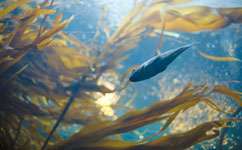Scientists find tiny fragments of plastic in the digestive systems of fish pulled from the English Channel

The discovery, by a team from Plymouth University and the UK Marine Biological Association, highlights the growing problem of plastic contamination of marine environments.
Of 504 fish examined, more than a third was found to contain small pieces of plastic less than one millimetre in size, referred to by scientists as microplastics.
'We have previously shown that on shorelines worldwide and on the sea bed and in the water column around the UK, these tiny fragments of plastic are widespread,' says Professor Richard Thompson.
'Our recent reseach has shown that such fragments are also being ingested by fish. Laboratory studies on mussels have shown that some organisms can retain plastic after ingestion, hence microplastic debris could also accumulate in natural populations.'
This, say researchers, could carry serious physical consequences for fish, creating blockages in their digestive systems or giving them a false sense of being full.
It could also make it easier for pollutants in surrounding waters to make their way into organisms, as chemicals latch on to the plastic fragments.
The study, published in Marine Pollution Bulletin, looked at fish caught ten kilometres off the coast of Plymouth.
But scientists have been finding plastics in increasingly remote places. A recent voyage to the Southern Ocean surrounding Antarctica found the once-pristine waters littered with plastics from far-flung places.
This debris comes from a number of sources. Some of the fragments come directly from personal care products, such as face scrubs and exfoliators, which contain microplastics as abrasives. Others form from the break-down of larger items such as bags and bottles.
But Thompson is optimistic that, with the right measures, plastic pollution is a problem that can be tackled without sacrificing the many benefits which come from the use of plastics in the 21st century.
'We don't need to have plastic debris in the sea. These materials are inherently very recyclable, but regrettably they've been at the heart of our throw-away culture for the last few decades.'
Earlier this month, Unilever announced that they are to cut plastic 'microbeads' from all of their personal care products by 2015. And Thompson believes that, with actions such as this, industry has an important role to play.
'We need to recognise the value of plastics at the end of their lives and need help from industry and manufacturers to widen the potential for every day products to be reusable and recyclable,' he adds.
More information: Lusher, A., McHugh M., and Thompson, R. Occurrence of microplastics in the gastrointestinal tract of pelagic and demersel fish from the English Channel, Marine Pollution Bulletin, 2012
Journal information: Marine Pollution Bulletin
Provided by PlanetEarth Online
This story is republished courtesy of Planet Earth online, a free, companion website to the award-winning magazine Planet Earth published and funded by the Natural Environment Research Council (NERC).


















